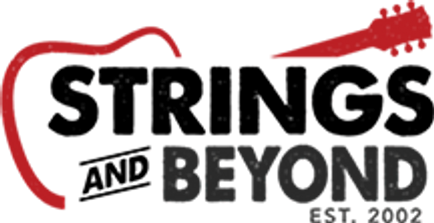Effects Pedals
Best Guitar Effects Pedals
While a guitar amplifier is great for establishing a baseline sound, many guitarists like to change things up — sometimes within the same song. Linking a guitar effects pedal to your rig lets you tweak the sound however you like. Add distortion and fuzz, increase the treble, kick in some overdrive or make the guitar sound fuller with some extra chorus — all by stepping on a pedal or turning a dial.
At Strings and Beyond, we have effects pedals for jazz guitar, classic rock, metal, country and every other style of music. From classic wah-wah pedals to micro-amps, loopers and digital effects, you can make your guitar sound exactly how it should for whatever you’re playing. A guitar effects pedal isn’t just for electric guitars, either. Acoustic guitar pedals can add reverb, delay and much more to your sound.
Guitar Effects Made Simple
We’re here to help you find the best guitar pedals at discounted prices. Some pedals are designed to produce a single type of effect while others have a variety of effects on different channels. There are even effects pedals with tuners that let you adjust the strings without unplugging. You can usually link multiple effects pedals into a setup, letting you switch between the effects or use them all at once.
Order the latest rock and jazz guitar pedals from Dunlop, Fender, Fishman and other brands. We have extra power supplies as well so that if a cord breaks, you don’t have to replace the pedal itself. Call us at (877) 830-0722 for answers to all your questions about effect pedals.
Guitar Effects Pedals FAQs
What is a guitar effects pedal?
A guitar effects pedal is a device that alters the sound of a guitar by adding effects such as distortion, reverb, delay, or modulation. These pedals are placed between the guitar and amplifier and are activated by pressing a footswitch. They are essential for shaping tone and enhancing musical expression.
What are the must-have guitar pedals?
Essential pedals include overdrive or distortion for added gain, a delay or reverb pedal for space and depth, and a tuner pedal for accuracy. Many guitarists also use modulation pedals like chorus, phaser, or flanger to create unique textures. The best pedal setup depends on the genre and playing style.
Are guitar pedals worth it?
Yes, guitar pedals can greatly expand a guitarist's sound and creative possibilities. They allow players to fine-tune their tone and add effects that are not possible with an amp alone. Even a simple pedalboard with a few key effects can transform a guitar's sound dramatically.
Should beginner guitarists use pedals?
Beginner guitarists don't necessarily need pedals but can benefit from a tuner pedal and a basic overdrive or reverb pedal. These can help with learning tone control and adding variety to practice sessions. As skills progress, players can explore different effects to enhance their style.
Best Guitar Effects Pedals
While a guitar amplifier is great for establishing a baseline sound, many guitarists like to change things up — sometimes within the same song. Linking a guitar effects pedal to your rig lets you tweak the sound however you like. Add distortion and fuzz, increase the treble, kick in some overdrive or make the guitar sound fuller with some extra chorus — all by stepping on a pedal or turning a dial.
At Strings and Beyond, we have effects pedals for jazz guitar, classic rock, metal, country and every other style of music. From classic wah-wah pedals to micro-amps, loopers and digital effects, you can make your guitar sound exactly how it should for whatever you’re playing. A guitar effects pedal isn’t just for electric guitars, either. Acoustic guitar pedals can add reverb, delay and much more to your sound.
Guitar Effects Made Simple
We’re here to help you find the best guitar pedals at discounted prices. Some pedals are designed to produce a single type of effect while others have a variety of effects on different channels. There are even effects pedals with tuners that let you adjust the strings without unplugging. You can usually link multiple effects pedals into a setup, letting you switch between the effects or use them all at once.
Order the latest rock and jazz guitar pedals from Dunlop, Fender, Fishman and other brands. We have extra power supplies as well so that if a cord breaks, you don’t have to replace the pedal itself. Call us at (877) 830-0722 for answers to all your questions about effect pedals.
Guitar Effects Pedals FAQs
What is a guitar effects pedal?
A guitar effects pedal is a device that alters the sound of a guitar by adding effects such as distortion, reverb, delay, or modulation. These pedals are placed between the guitar and amplifier and are activated by pressing a footswitch. They are essential for shaping tone and enhancing musical expression.
What are the must-have guitar pedals?
Essential pedals include overdrive or distortion for added gain, a delay or reverb pedal for space and depth, and a tuner pedal for accuracy. Many guitarists also use modulation pedals like chorus, phaser, or flanger to create unique textures. The best pedal setup depends on the genre and playing style.
Are guitar pedals worth it?
Yes, guitar pedals can greatly expand a guitarist's sound and creative possibilities. They allow players to fine-tune their tone and add effects that are not possible with an amp alone. Even a simple pedalboard with a few key effects can transform a guitar's sound dramatically.
Should beginner guitarists use pedals?
Beginner guitarists don't necessarily need pedals but can benefit from a tuner pedal and a basic overdrive or reverb pedal. These can help with learning tone control and adding variety to practice sessions. As skills progress, players can explore different effects to enhance their style.
